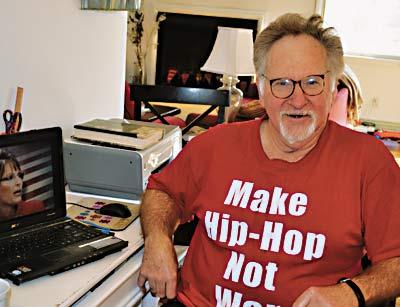Assessing Occupy

“If Dr. King were alive today, I firmly believe he would be an ‘Occupier,’ ” Mark Naison, a professor of African-American studies and history at Fordham University, said this week.
Speaking during the Rev. Dr. Martin Luther King Jr. weekend at a meeting of Occupy the Hamptons on Sunday, and in subsequent interviews, Dr. Naison said the Occupy movement had brought the issues of economic inequality that Dr. King had raised to the forefront of political discourse.
“We all have to follow Dr. King’s example, and be drum majors for justice,” he said, after the group watched a video of Dr. King’s “drum major” speech. Before he was gunned down, “Dr. King was supporting striking sanitation workers in Memphis and on the verge of leading a poor people’s campaign, which bore more than a little resemblance to today’s Occupy movements,” Dr. Naison said.
Dr. Naison has been an activist since the civil rights movement of the 1960s. An eight-year resident of Springs, he suggested that Occupy the Hamptons include music at its events and focus on problems of local residents, such as housing foreclosures, the needs of veterans, and hunger. He said the Springs School did not have an adequate lunch program.
Asked whether the Occupy movement was going to grow, Dr. Naison said, “This is just the beginning. These are the leaders of tomorrow . . . the problems are deep . . . we as a society need to do something.” He noted that the civil rights movement, shich he called one of the most important movements in American history, had begun with a student sit-in.
Dr. Naison, a frequent guest speaker, was interviewed on ABC television when Occupy Wall Street first occurred and said he is able to address both advocates and critics of the movement. The major issues today, he said, are unemployment and the unequal distribution of wealth.
Dr. Naison has appeared on “The O’Reilly Factor,” the Discovery Channel’s “Greatest American Competition” (as Dr. King’s advocate), and on “The Dave Chappell Show” in a skit called “I Know Black People.” His videos can be seen online, including “The Palin Effect” and “Stimulate Me,” and he has written three books: “White Boy: A Memoir,” “Communists in Harlem During the Depression,” and “The Southern Tenants Farmers Union and the C.I.O.”
As a professor, Dr. Naison calls himself the Notorious Ph.D. His Fordham courses include “The Sixties: Years of Protest, Years of Change,” “The Worker in American Life,” and “From Rock and Roll to Hip-Hop.” He uses rap to connect with his students, he said.
On Jan. 7, Dr. Naison was the guest speaker at a meeting of the Southampton Democratic Club at the Southampton Publick House. Ninety-seven people attended, of which 25 percent were first-time participants. “That percentage is a first,” Grania Brolin, one of the event organizers, reported in an e-mail.
Dr. Naison’s talk included statistics on economic inequality. He reported saying that the “Walmart C.E.O. makes $16,000 an hour while entry level workers make $6.50 an hour,” and that the income in New York of the 1 percent was now 44 percent of the total state income, up from 9 percent in the 1950s and ’60s.
“In my opinion,” he said in an interview, “people thought trickle-down economics worked. Most people thought that the very wealthy were an essential source of jobs.” The Occupy movement is tapping into the anger and frustration of youth who can’t find jobs and are saddled with student loans, he said. “Their counterparts in other countries had been doing this for months prior.”
With the housing market collapse and the economic crisis, “the whole rationale for trickle-down economics began collapsing like a house of cards,” he said.
Because of Occupy Wall Street, Dr. Naison said, “A damn burst and a new language to describe economic inequality took hold like wildfire, dominated by the image of the 1 percent and the 99 percent.” “Occupy” became a new metaphor. “The transformation has been nothing short of remarkable,” he said.
“These young people who are protesting have found a way of forcing our society to deal with economic inequality in a way that scholars like myself have not been able to do. . . . The protesters are giving voice to a generation that is . . . no longer needed in this society even though they are educated and skilled. They are turning this into a reality that can’t be ignored.”
Dr. Naison recently became a founding member of the Fordham University 99 Percent Club. He helped to write the organizing principles, which he said include disseminating accurate information about worldwide movements, providing support to local movements, taking action against economic inequality and threats to freedom of expression, and creating networks among supporters of the Occupy movement. He stressed that such clubs allow people to participate in a wide variety of protests.
A post on his Facebook page says, “We need leaders among the people, not leaders of the people.” This week he said, “Nothing I have experienced in 40-plus years of activism, including my experience with the Occupy movement and the 99 Percent Clubs in the last six months, has convinced me this approach is wrong.”
